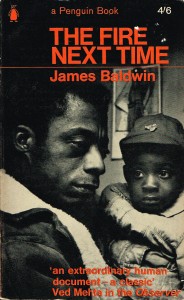In James Baldwin’s The Fire Next Time, he speaks about the condition of African Americans in the 1950-60s and much of the injustices they faced. The book is split into two essays. The first, “My Dungeon Shook,” is an epistle to his young nephew addressing the issues the author projects the boy to encounter being born in an era of civil strife. The second essay, “Down At The Cross,” details personal memories of the author’s life — from locally popular youth minister to a leading voice in the civil rights movement — and provides reflective insight to issues he’d faced. The book does not offer numbered facts nor does it urge its readers to view the civil rights era in any particular view. It is written as a personal, and sometimes emotional, account of the author’s life and explores areas in society that he perceives fault.

Fire Next Time is one of many examples of expository writing. That is, in this case, it collects experiential data and orders it to the culturally dominant mode of thinking, then it attempts to reason why the culturally dominant mode of thinking as such. Expository writing is a rhetorical mode concerned with informing its audience about a subject it covers. It is different from persuasive writing, though it can be persuasive, in that it is not attempting to convince its readers to believe in an argument the writer posits; rather, it encourages the readers to develop their own ideas based on the information presented. In many passages of “Down At The Cross” Baldwin asserts the misgivings of his younger self and reveals his later apprehensions to position himself within the circles of formidable civil rights leaders. He details his diverging opinions with many of his contemporaries in achieving racial and civil equality, yet he doesn’t charge them for seeking a disparate ultimate goal. Expository writing, in Baldwin’s case, utilizes personal views on the immediate world to address areas that need improvement.
I bought the book several years ago to explore a different voice of the sixties. I wasn’t necessary concerned about the content of the book, but I did want to read Baldwin’s exercise in explaining scenarios of oppression and the ways he elucidated these injustices differently from more common voices. I went on forums and relied on user ratings before I stumbled on a contemporary review touting the author’s essays as two of the most influential of its era. The book itself may represent an artifact of material culture in that it represents much of the thinking of it’s time. The civil rights movement sought to combat discontent with the present state of the nation and much of it had to do with injustices of the past. And similar to this notion, Baldwin, in his book, expresses those same feelings of discontent, while exploring how his younger self influenced the person he grew to be. Material culture analysis is concerned with forming thorough inferences about a culture through the the items they used. In this case, Baldwin’s work was a critical success, and with this accolade, we can assume that he was able to speak on behalf of many in his generation.

To quote a passage from your work, I really enjoyed, “[Exposition] collects experiential data and orders it to the culturally dominant mode of thinking, then it attempts to reason why the culturally dominant mode of thinking as such. Expository writing is a rhetorical mode concerned with informing its audience about a subject it covers. It is different from persuasive writing, though it can be persuasive, in that it is not attempting to convince its readers to believe in an argument the writer posits; rather, it encourages the readers to develop their own ideas based on the information presented. ”
You present the idea of expository writing in a clear and easy to understand fashion, bringing in the Baldwin book as a clear-cut example of expositional expression in American culture.
Great contrast between Expository and persuasive writing. The book you used to describe the two type of writing is an excellent illustration. As stated in you respond to prompt “Fire Next Time is one of many examples of expository writing. That is, in this case, it collects experiential data and orders it to the culturally dominant mode of thinking, then it attempts to reason why the culturally dominant mode of thinking as such. Expository writing is a rhetorical mode concerned with informing its audience about a subject it covers”.
In my experience in this class, I have realized that expository writing is a form of collecting information and drawing your observation, and exploring it to the extent of your experience. In addition connecting it to what you have learned from object or history of it. Oppose to persuasive writing where the writer is trying to impose their feeling and convince the reader to agree.
Your post definitely compared and contrasts the two, and also expressed a way the types of writing can be used interchangeable.
This was a great and insightful blog post. As a young African American in the wake of the social issues that plague us today, your example couldn’t have done a better job of illustrating exactly what expository writing is. When we first began this class, I had a hard time grasping the concept of expository writing. I have spent the majority of my time engaging in argumentative writing (I’m a philosophy major), and I feel that your definition would have aided my understanding a bit earlier. Your comparison to persuasive writing hit the nail on the head. I feel that as college writers, we have a firm grasp of the understanding of persuasive writing, and to start their and draw a comparison is extremely useful in explaining expository writing. Once again, great job I really enjoyed your post!